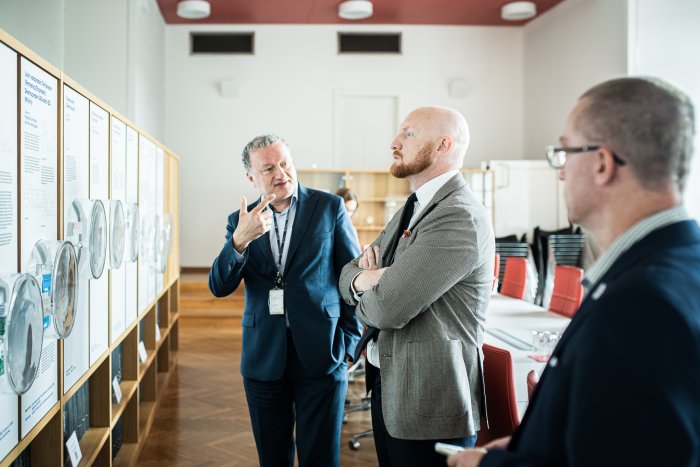As the new British Ambassador to the Czech Republic, he started off with a bang, as the #jsemtunovej campaign got a great response from the wider public and media experts alike. Although he has been in office only for a few months, he is no longer that “novej” here. In his interview for TRADE NEWS, Matt Field talks about his impressions of the Czech Republic so far, explains how he is helping develop business relations between Czech and UK companies and describes the current and future cooperation between our countries in today’s post-brexit world.
Let’s start with your impressions from the first few months so far.
It has been a great start. I am probably no longer ‘novej’, especially in Prague, but there is still a lot of the country I have not visited yet. I have set myself the target of visiting all regions in my first year as Ambassador here. I recently returned from Plzen, and have trips planned to Olomouc, Zlin and Usti Nad Labem. There have been lots of highlights: Colours of Ostrava, Hrabal’s chata in Kersko, and visiting the Pilsner Urquell brewery. I am excited about what I will discover next.
What have you set as the main goals for your diplomatic mission in the Czech Republic? What’s your vision for what British-Czech relations should be like in four years’ time?
It is a special responsibility to be the UK Ambassador to the Czech Republic, because of the long and deep history between our two countries. I am very conscious of the legacy of Czechs who flew with the RAF, TG Masaryk’s ties to the UK, or the relationship between then Prince Charles and President Vaclav Havel. But my job now is to build on this strong foundation, and deliver more for both countries in the period ahead of us.
Ukraine is a clear priority, as we both work to defend all European security against Russian aggression. I am pleased that bilateral trade has increased by 17% over twelve months, but I know we can do better. We also cooperate closely on other international challenges, including China, new technologies, the Western Balkans, or illegal migration. And I want to strengthen further those links between our people, including scientific cooperation, cultural exchanges, and sporting connections.
The good news is that both Czech and UK business are adapting well to the new trade environment, as represented by an increase of trade by more than 17% in 2022.
Cooperation in energy, healthcare and green tech
What would you list as your biggest achievements so far in economic diplomacy or in promoting business relations between Czech and British companies?
We have seen a lot of senior meetings and interactions in the first few months of my tenure. Last month Andrew Bowie, our Minister for Nuclear Energy and Networks, came to Prague to sign a joint statement of cooperation with Minister Jozef Síkela. This opens the way for much closer cooperation, particularly on the new technologies of Small Modular Reactors. We have also signed a UK-Czech Memorandum of Understanding on the rail sector, to further increase collaboration and knowledge exchanges. We have also seen a Czech delegation participate in the Ukraine Recovery Conference in London, and UK healthcare companies in Prague to discuss joint opportunities in Ukraine. I am really excited about what our countries can do together in the area of renewable energy and sustainability, such as Gravitricity, a Scottish company that is working with Diamo and Technical University Ostrava to build a full-scale demo of their gravity battery project, deep in the unused Darkov mine.
Can you tell our SMB readers about the activities and events of the Embassy intended specifically for businesses?
The UK presents a fantastic opportunity for dynamic business growth, and offers one of most ambitious ecosystems in the world to grow innovative companies. The British Embassy organizes or partners on many events focused specifically on SMBs.
Our Trade team prepared a trade show called ‘Proudly British’, which focused on new UK brands from the Consumer and Retail sector. The Coronation festival we organized in Westfield Chodov this May included a ‘British market’, where Czech customers could try and buy UK products. We do not only connect new UK brands with the Czech distributors but we also continuously work with and support the UK brands at the Czech market.
The British Embassy in Prague is also home to a European Trade department which focuses on supporting British SMBs and their introduction to partners all around Europe, including Czech Republic. The Trade Team of the Embassy focuses on Foreign Direct Investment as well, helping Czech investors that are interested in setting up a business in the UK – this includes both well-established businesses and rising tech companies.

Ambassador Matt Field and Director of the Institute of Organic Chemistry and Biochemistry of the CAS Jan Konvalinka. Together they discussed how to improve research cooperation and attract young British scientists to Prague.
Future in R&D and education
Before Brexit, British-Czech cooperation flourished also in R&D and education. Has this been impacted by Brexit?
It has been a setback but not a big one. I personally am very ambitious about increasing the levels of scientific and educational exchanges. In November we are organizing a Trans-National Education trade mission, bringing 8-10 UK universities to meet with their local counterparts and the Ministry of Education, to talk about ways they could cooperate more closely. British universities remain world class, with 3 universities in the top ten globally.
Czech and British researchers work on over 2,000 jointly co-authored research papers annually. But there is still much more space for collaboration.
Czech researchers continue working closely with British partners and the number of jointly co-authored research papers continues to grow, over 2,000 annually. With the UK joining the Horizon and Copernicus scientific programmes, I encourage Czech researchers to include British teams to their consortia and actively seek partners in British universities.
UK remains a trusted ally
What is today’s post-Brexit Britain like? Do the British still consider themselves part of Europe? In what aspects is Britain still closer to Europe than to the US or the Commonwealth countries?
The process of implementing Brexit has taken some time. But since the war in Ukraine, and the agreement reached concerning Northern Ireland known as the Windsor Framework, relations between Brussels and London have become much stronger. Leaving the EU never meant leaving Europe, and we remain as committed to security, including through NATO, as ever before. The decision to join Horizon is another positive indicator of where the relationship is heading. That said, we are still very close to the US, and to our partners in the Commonwealth. This will not change, and it does not need to change, because we are still the same trusted and reliable ally we have always been.
What exactly do today’s Britain and Czechia have most in common?
A lot. In addition to the long history that I have already mentioned, we have a similar approach to the world, rooted in our democratic values and strong sense of fair play. We stand up to those attempting to bully others, such as Russia’s attacks on Ukraine. We believe in free trade, and are nations of inventors and problem solvers. We like to laugh at the same things, especially those who take themselves too seriously. And we know how to enjoy ourselves, through the arts, sport, enjoying the natural world, and with a beer or glass of wine in our hand. I truly feel at home.
Matt Field was interviewed by Daniel Libertin
Photo credits: Matt Field



